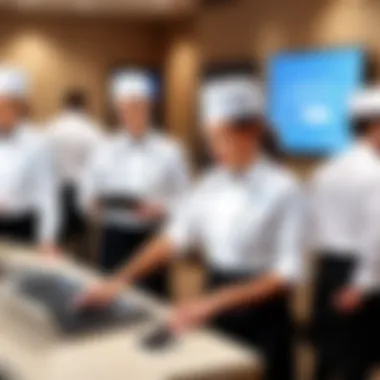Exploring Madison Hospitality Jobs: Opportunities & Insights


Intro
Madison, a city known for its vibrant arts scene and quality of life, also boasts a robust hospitality industry. Exploring jobs within this sector reveals a wealth of opportunities for job seekers. This city not only incorporates the classic hospitality roles such as waiting staff and hotel management, but it also includes niche positions that reflect current trends and technologies in the workplace.
As you navigate the landscape of hospitality jobs in Madison, you can expect to encounter specific qualifications, dynamic industry trends, and various paths for career advancement. Whether you are an industry insider or someone looking to break into the hospitality field, understanding these elements can offer valuable insights. In this article, we look to detail the significant aspects of Madison's hospitality sector, providing key information that can help individuals make informed decisions.
Tech Trend Analysis
Overview of the current trend
The integration of technology in the hospitality sector has become increasingly prevalent. In Madison, businesses leverage various technological tools to enhance customer experience, streamline operations, and increase overall efficiency. Systems like online booking, mobile payment, and customer relationship management (CRM) software are now common in many establishments.
Implications for consumers
For consumers, these technological advances translate to improved service. Guests can expect faster check-ins, personalized offers based on prior stays, and access to real-time support. These enhancements not only make the experience smoother but often lead to higher satisfaction rates among patrons.
Future predictions and possibilities
Looking ahead, the role of technology is likely to expand. Advancements such as artificial intelligence (AI) will play a greater part in tailoring customer experiences. Additionally, as the trend of eco-friendly solutions grows, expect more innovations focused on sustainability, aligning customer experience with a sense of social responsibility.
Preface to Madison Hospitality Jobs
The hospitality sector plays a significant role in Madison's economic and social fabric. Understanding this sector helps job seekers uncover various opportunities available to them. Madison's unique atmosphere, coupled with its diverse population, creates a vibrant environment for job prospects in hospitality. Exploring the entry points into this career field can lead to rewarding positions for individuals looking for work and growth in their professional lives.
Understanding the Hospitality Industry
The hospitality industry encompasses a range of services, from hotels and restaurants to event planning and travel services. In Madison, this industry is particularly dynamic, thanks to the city's status as a cultural and educational hub. Numerous attractions bring both locals and tourists, ensuring a steady demand for hospitality jobs.
The industry's structure includes various roles, catering to different skill sets and educational backgrounds. Front-of-house positions, such as waitstaff and receptionists, require strong interpersonal skills and customer orientation. On the other hand, back-of-house jobs, including kitchen staff and maintenance roles, often value practical experience and technical skills. Together, these roles contribute to the seamless operation of hospitality businesses in the area.
Another facet that defines the hospitality industry is its capacity for growth and adaptation. Topics like sustainable practices and the influence of technology not only reshape existing jobs but also create new opportunities. As Madison continues to evolve, so do its hospitality offerings, highlighting the need for skilled professionals who can navigate this changing landscape.
Economic Impact of Hospitality in Madison
The hospitality industry significantly contributes to Madison's economy. It generates jobs, stimulates local business, and enhances cultural diversity. Job creation in this sector impacts both direct employment, such as those in restaurants and hotels, and indirect employment through services like suppliers or transportation.
According to studies, every new dollar spent in the hospitality sector can generate additional economic activity. This recognition of hospitality's importance underscores its role in the community, evolving from a subordinate sector to a cornerstone of economic growth. Furthermore, the revenue garnered from tourists bolsters city finances, allowing Madison to invest in infrastructure and public services that benefit all citizens.
With many small to medium-sized enterprises serving the local population, the economic ripple effect extends beyond immediate hospitality services. Local producers also gain, providing fresh ingredients, artwork, and crafts while integrating into Madison's economy.
The interdependence between hospitality and the local economy remains vital. Understanding this relationship equips potential workers with knowledge of the industry and its potentials, making it essential for both job seekers and existing professionals.
In summary, the hospitality landscape in Madison presents vast opportunities underscored by significant economic implications. Awareness of the industry's dynamics can be advantageous for those entering or advancing their careers in this sector.
Types of Hospitality Jobs Available in Madison
The variety of hospitality jobs in Madison reflects not just the city’s vibrant cultural scene, but also its robust economy. Understanding this landscape is critical for both job seekers and existing professionals aiming for advancement. The roles available can cater to a diverse range of skills and experiences, providing numerous benefits and considerations for anyone looking to enter or progress in the hospitality sector. Whether one is interested in face-to-face interactions or behind-the-scenes operations, Madison has opportunities that appeal to different preferences and abilities.
Front-of-House Positions
Front-of-house positions in Madison are all about guest interaction. These roles include hosts, servers, bartenders, and receptionists. They are crucial in crafting an enjoyable experience for customers, often serving as the first point of contact. As the hospitality industry evolves in response to consumer needs, the demand for professionals who excel in customer service has never been greater.
Skills required in front-of-house roles consist of:
- Communication skills: Clear dialogue with guests and team members.
- Interpersonal skills: Abilities to engage positively with diverse individuals.
- Problem-solving capabilities: Quickly addressing any guest issues or concerns.


This position can also serve as a launchpad for further career growth. Savvy professionals can leverage their experience into management positions in a relatively short time.
Back-of-House Opportunities
Back-of-house jobs focus more on the operational aspects of hospitality. These typically include kitchen staff, maintenance, and other support services. In Madison, these opportunities are essential in maintaining the seamless functioning of hospitality venues.
A well-run kitchen or housekeeping team can significantly enhance the guest experience. Therefore, candidates should showcase their efficiency and ability to work as part of a collaborative group. Some of the common back-of-house roles are:
- Kitchen staff: Cooks and chefs responsible for food preparation.
- Housekeepers: Maintain cleanliness in hotels and restaurants.
- Support staff: Assist with inventory and supplies.
Success in these positions often hinges on attention to detail and the capability of working under pressure, especially during busy periods.
Management and Supervisory Roles
Management and supervisory positions in Madison's hospitality sector require a different skill set compared to entry-level jobs. These roles include restaurant managers, event coordinators, and hotel operations managers. People in these jobs oversee daily operations, ensuring everything runs smoothly while maximizing customer satisfaction.
Some key responsibilities typically involve:
- Staff Training: Ensuring that all new employees get proper onboarding.
- Budget Management: Utilizing resources efficiently and maximizing revenue.
- Quality Control: Monitoring service and food quality to uphold standards.
Having experience in lower-level roles can be beneficial when climbing the career ladder in hospitality management. Performing well in this environment demands not just administrative skills but also strong leadership qualities.
Qualifications for Hospitality Jobs in Madison
Understanding the necessary qualifications for hospitality jobs in Madison is critical for job seekers and industry professionals. These qualifications establish a clear pathway to gaining employment in a competitive market. The hospitality sector is vast and diverse, thereby necessitating a varied mix of education, training, and skills that can increase employability and career advancement. An awareness of these qualifications also allows individuals to tailor their pursuits, whether that means seeking formal education or enhancing certain competencies relevant to the field.
Educational Background Requirements
In general, educational qualifications in hospitality largely depend on the specific role a candidate aspires to occupy. Many entry-level positions in Madison's hospitality sector may require only a high school diploma. However, having a degree or coursework in areas such as hospitality management, business administration, or even culinary arts can enhance one's candidacy. A bachelor’s degree may be advantageous for those aiming for supervisory positions or opportunities in higher-end establishments.
Institutions like Madison Area Technical College provide programs tailored specifically for hospitality professionals. Attending workshops or courses related to guest service can provide a competitive edge. Furthermore, internships often associated in many programs offer real-world experience that is invaluable in the hiring process.
Certifications and Training Programs
While educational qualifications are notable, specific certifications can significantly enhance a candidate's prospects in this industry. Certificates in food safety, CPR training, and customer service management establish a layer of professionalism that employers respect. Programs like ServSafe certification and the Certified Hospitality Supervisor provide essential foundations needed in this sector.
In Madison, various resources offer training programs designed to equip candidates with relevant skills. Community organizations may facilitate short courses that cover the essential information and experiences necessary for compliance and understanding of hospitality regulations. These certifications often come with networking potential, providing access to local industry connections.
Key Skills Necessary for Success
Successful hospitality professionals in Madison need to possess more than just formal education and certifications; it is essential to recognize the essential skills pertinent to this field. Some key skills include:
- Communication - Interpersonal skills are crucial for interacting effectively with guests and team members.
- Problem-Solving - Challenges are inherent in hospitality roles, and being solution-oriented will greatly enhance customer satisfaction.
- Adaptability - The environment can be fast-paced and shifts may occur quickly. A willingness to adapt helps maintain high standards despite changing conditions.
- Attention to Detail - This skill ensures that the teams track and fulfill guests’ needs, improving quality of service.
Lastly, showcasing a positive attitude can also significantly impact how one is received by consumers and coworkers alike. Hiring managers tend to prioritize a candidate's likeliness to engage positively with guests, further driving the importance of interpersonal skills in this sector.
Job Search Strategies in the Madison Hospitality Industry
Job search strategies are vital when exploring job opportunities in the hospitality sector. Those aiming for positions in Madison's lively industry can benefit significantly from structured approaches. Effective job search methods help candidates reach not only their potential employers but also perfect alignments with their skills and values.
The hospitality industry is a competitive space. Understanding how to stand out can lead one towards lucrative and fulfilling positions. Using diverse methods can enhance this journey. Having a clear strategy can optimize time and increase the odds of a successful outcome. Various techniques available can aid job seekers in navigating the market successfully.
Utilizing Online Job Portals
In today's digital age, online job portals have transformed the way job seekers look for opportunities. Websites such as Indeed, Glassdoor, and LinkedIn allow candicates to browse through job listings with ease. These platforms also offer insights into employers, helping applicants gauge company cultures.
- Keyword Searches - Job seekers can refine searches using specific keywords related to the desired position.
- Filtering Options - Most portals provide filters for location, experience level, and pay range. This feature helps tailor search results.
- Setting Alerts - Candidates can set up job alerts to be notified of new postings that meet their criteria, ensuring they never miss an opportunity.


Although the convenience is substantial, applying through job portals should not be the singular approach. Some listings can be competitive or may lack personal touches.
Networking within the Local Industry
Networking is essential for establishing connections in any field. In the Madison hospitality industry, face-to-face interactions can create opportunities often overlooked through traditional job searching tools. Networking can be approached in various ways:
- Industry Events - Participating in gatherings like trade shows or local hospitality fairs can introduce candidates to hiring managers directly.
- Professional Associations - Joining associations like the Wisconsin Restaurant Association provides access to resources and networking possibilities.
- Online Networking - Engaging on platforms like LinkedIn can help in making connections and even finding informal recommendations for jobs.
Connections made through networking can lead to insider knowledge on job openings or improve one's understanding of industry dynamics.
Crafting an Effective Resume
An effective resume serves as a powerful marketing tool. A well-structured resume is essential when applying for hospitality jobs. Many hiring managers skim through numerous applications, meaning candidates need to capture attention quickly.
- Focus on Relevant Experience - Emphasizing jobs or roles directly related to hospitality can clarify a candidate's expertise and suitability.
- Use of Keywords - Integrating industry-specific keywords helps pass Applicant Tracking Systems, often used by employers to screen resumes.
- Concise Presentation - Resumes should not exceed one page where possible, maintaining clear and bullet-pointed sections.
Consider customizing the resume for each job application. A tailored resume can significantly increase the likelihood of landing interviews.
Trends Affecting the Hospitality Job Market in Madison
The job market within Madison's hospitality sector is influenced by several trends that shape its landscape. Understanding these trends is crucial for anyone looking to advance their career or attract potential employers in this vibrant industry. In particular, three key areas stand out: the impact of technology, sustainability practices, and diversity initiatives. Each of these elements offers unique insights into the evolving requirements of hospitality jobs and how they reflect broader societal values.
Impact of Technology on Hospitality Jobs
Technological advancements have always played a significant role in the hospitality sector. Today, they do even more as hotels and restaurants leverage new tools to optimize their operations.
- Online Booking Systems: These have transformed how customers interact with hospitality services. Guests now expect seamless online booking experiences. Professionals in hospitality must not only understand these systems but also how they affect customer satisfaction.
- Artificial Intelligence: AI technologies are used for customer service roles in hospitality. For example, chatbots can handle booking inquiries, freeing up human staff for more complex tasks. This adds a layer of efficiency that can enhance the guest experience.
- Data Analytics: It has also emerged as a key aspect that organizations utilize to make strategic decisions. Understanding customer preferences allows businesses to tailor their offerings.
By embracing technology, job seekers can better position themselves within Madison's hospitality job market.
Sustainability Practices in Hospitality
As environmental concerns gain momentum, the hospitality industry in Madison is shifting towards more sustainable practices. Many facilities focus on green initiatives.
- Energy Efficiency: Many local hotels are adopting energy-efficient systems. Investment in solar power and energy-saving appliances has become common.
- Local Sourcing: Restaurants have prioritized using local produce to reduce their carbon footprint. Not only does this help the environment, but it also supports local farmers.
- Waste Management: Effective waste reduction programs are gaining traction. Properties are beginning to implement recycling and composting strategies actively.
Hospitality careers will likely expect familiarity with these practices from candidates.
Diversity and Inclusion Initiatives
An essential element affecting Madison's hospitality job market is the growing focus on diversity and inclusion. Organizations recognize that a diverse workforce enhances creativity and fosters better decision-making.
- Planning Initiatives: Businesses are adopting policies that support a more diverse workforce, from recruitment practices to employee training programs.
- Inclusive Policies: Implementing inclusive service approaches leads to better service for clients from various demographic backgrounds.
- Community Engagement: Establishing relationships with different community groups fosters a culture of inclusivity. Such practices are beneficial to both employees and guests.
Familiarity with diversity initiatives will set candidates apart in the hiring process.
The trends within Madison's hospitality job market reflect critical societal shifts over recent years. Adapting to these changes remains vital for sustained success for professionals in this sector.
Career Advancement in Madison's Hospitality Sector
Advancing in a hospitality career in Madison requires intentional strategies. The industry is dynamic and offers many opportunities for growth. Understanding these pathways can lead to fulfilling professional outcomes. These advancements benefit not only individual professionals but also enhance the overall quality of the service within the hospitality sector. The significance of career advancement cannot be underestimated.
Pathways to Management Roles
To move into management roles within Madison's hospitality sector, one must take calculated steps. Usually, individuals start in entry-level tasks to gain experience. Working at places such as The Madison Concourse Hotel & Governor's Club or the Overture Center can provide practical exposure. From here, working toward specific management training programs becomes essential.


Key pathways include:
- Gaining job experience in various departments.
- Seeking leadership opportunities within current positions.
- Pursuing a degree in hospitality management, which can streamline elevation to management.
Additionally, demonstrating leadership qualities early in one’s career can set a candidate apart. A management candidate should also develop business acumen through understanding budgeting, team dynamics, and strategic planning.
Professional Development Opportunities
In Madison, continuing education and professional development play a critical role. Many establishments support their employees in attending workshops or industry conferences. Institutions like Madison College offer specialized training. Participation in these programs can help individuals gain or refine skills pertinent to current market demands.
Development opportunities include:
- Workshops on leadership and communication.
- Online courses related to service excellence.
- Participation in food and safety certifications, which are often required in specific roles
Investment in oneself through these programs can greatly influence further advancements within the hospitality career ladder.
Mentorship and Coaching in the Industry
Mentorship is a vital component in navigating hospitality careers. Many experienced professionals recognize the importance of coaching newcomers. Building a relationship with a mentor can open doors to valuable advice and insights. These relationships can often guide individuals through challenges faced in the workplace.
Seeking guidance from local figures in Madison’s hospitality scene can also build a network. Establishments often encourage mentorship engagements, thus creating a nurturing environment.
Benefits of effective mentorship include:
- Personalized feedback on performance.
- Connections to job opportunities that may not be announced publicly.
- Enhanced problem-solving skills through shared experiences.
Thoroughly engaging with mentors helps individuals not only advance in their career trajectories but also deepen their understanding of industry nuances.
Work-Life Balance in Hospitality Careers
Work-life balance is a critical consideration for those engaged in hospitality careers. The sector demands high levels of service and adaptability, often resulting in long hours and unpredictable schedules. Therefore, understanding this aspect is essential for sustaining both professional performance and personal well-being.
Understanding the Demands of the Industry
The hospitality industry is inherently different from other fields in terms of its operational style. Many businesses in this sector run on a shift basis. Staff members can find themselves working late nights, weekends, and holidays.
Such rigorous commitments can lead to burnout if not managed properly. Workers often juggle customer service, team coordination, and personal responsibilities while under pressure. Moreover, empathy and attentiveness to guests’ needs can amplify stress levels, particularly during peak seasons when demand surges. Hence, it is vital to recognize these challenges for establishing a compatible work-life harmony.
Strategies for Managing Work Hours
Effectively managing work hours is key to achieving a balance in hospitality roles. Here are practical approaches that individuals can take:
- Set Clear Boundaries: Designate fixed hours for work activities versus personal time. Ensure colleagues and supervisors understand these boundaries to promote mutual respect.
- Utilize Scheduling Tools: Leverage digital scheduling applications to keep track of shifts and plan personal activities. This allows for better foresight of busy periods and personal events.
- Communicate with Management: Discuss flexible scheduling options with management. Requesting adaptations can create a less stressful experience while ensuring productivity is maintained.
- Establish Recovery Time: After intensive work periods, allocate time to recuperate. Ensure you prioritize downtime to empower rejuvenation for sustained performance.
Work-life balance isn't simply about time management; it's a commitment to overall wellness and job satisfaction.
- Pragmatic Planning: Embrace the art of planning, not just daily tasks but also long-term commitments. Prioritize those that require the most attention.
Culmination
In considering the landscape of hospitality jobs in Madison, the conclusion encapsulates various key points that underscore the industry’s potential and viability. As the job market evolves, hospitality careers showcase a blend of challenges and fruitful opportunities.
The Future of Hospitality Jobs in Madison
Looking towards the future, the hospitality sector in Madison is poised for growth. Driven by an increasing influx of tourism and a burgeoning local economy, job openings are likely to multiply. Moreover, employers are puting more emphasis on technological tools such as AI chatbots and mobile apps to enhance customer experience. Therefore, professionals in this field will need to remain agile and continuously adapt.
New developments, such as attractions and events held in various venues, drive the demand for hospitality services. Consequently, there appears an upward trajectory in front- and back-of-house positions alike. Upskilling through programs can keep professionals competitive. Incorporating sustainability into operations will also likely become an essential factor for the new generation of hospitality employers. This change will not only address contemporary circumstances but can also enhance the marketability of businesses.
Final Thoughts on Pursuing a Career in Hospitality
Pursuing a career in hospitality — especially in Madison — can be both rewarding and fulfilling. This industry reflects diversity in its job offerings and can cater to varied interests. From functional roles, like line cook, to strategic positions like hotel management, the possibilities are vast.
A strong foundation in customer service and managerial skills can significantly boost one’s career trajectory. Moreover, embracing a growth mindset is crucial. Not only must one learn to cope with unique demands, but individuals must also seek mentorship and professional development opportunities around Madison. Whether working on skills or networking, persistent effort leads toward eventual advancement. The hospitality JOB sector is an exchange of hard work for personal and professional growth that ultimately benefits both employees and the Madison economy.



